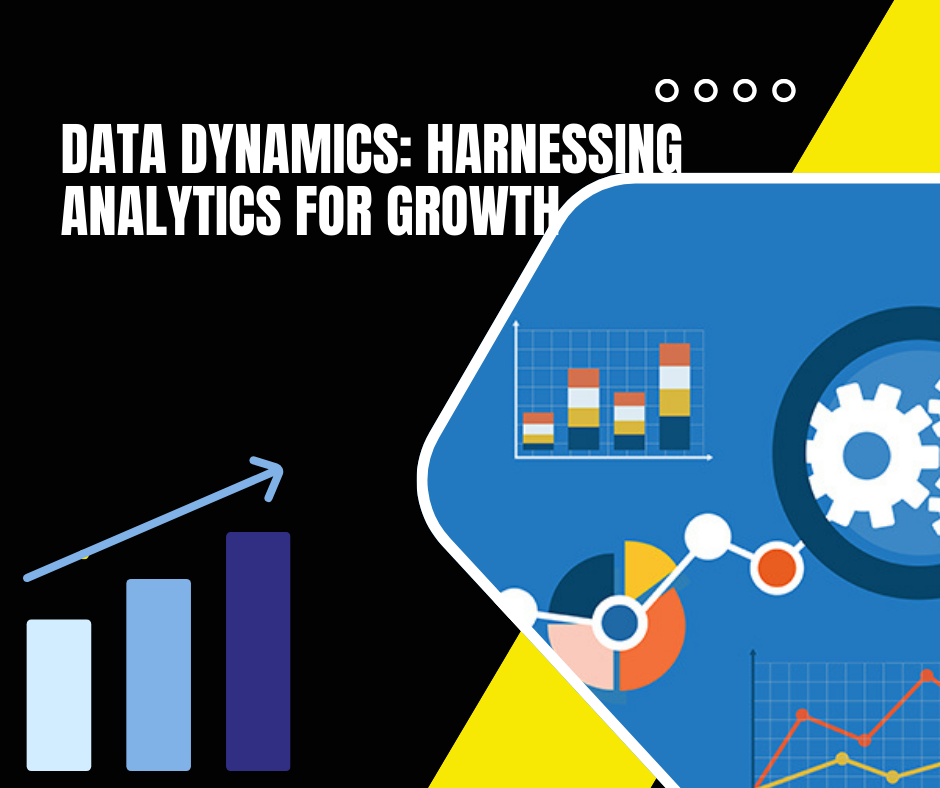Data Dynamics: Harnessing Analytics for Growth
 Ruhi Parveen
Ruhi Parveen
In today's data-driven world, businesses and organizations are harnessing the power of analytics to fuel growth, make smarter decisions, and gain a competitive edge. The explosion of data from digital platforms, IoT devices, and business operations has made data analytics a critical tool in various industries. This guide explores how data dynamics can drive growth through effective analytics strategies.
What Is Data Analytics?
Data analytics is the process of analyzing data sets to extract insights and conclusions from the information they hold. By using specialized systems and software, data analytics professionals can transform raw data into actionable insights. The insights gained from data analytics help businesses improve decision-making, optimize operations, enhance customer experiences, and ultimately foster growth.
Types of Data Analytics
There are four primary types of data analytics, each serving a different purpose in driving business insights:
Descriptive Analytics: Summarizes historical data to reveal patterns and trends. For example, a retail business might analyze past sales data to understand purchasing patterns.
Diagnostic Analytics: Helps in understanding the reasons behind past trends and events. It digs deeper into the data to explain why something happened.
Predictive Analytics:Predictive analytics employs historical data, machine learning, and statistical algorithms to anticipate future outcomes. It can be used to forecast sales trends or customer behavior.
Prescriptive Analytics: Suggests possible courses of action based on predictive data. This type of analytics not only predicts what might happen but also suggests how to handle those outcomes.
The Role of Data Analytics in Business Growth
Businesses that utilize data analytics effectively can gain a significant advantage over their competitors. Here are some of the key ways in which data analytics fosters business growth:
1. Informed Decision-Making
Data analytics provides businesses with factual data to guide their decisions. This removes the guesswork and subjective judgment from business strategies. By analyzing market trends, customer behavior, and sales data, businesses can make informed choices about where to allocate resources or how to structure marketing campaigns.
2. Improving Customer Experience
Customer experience is one of the most significant drivers of business growth. Data analytics helps businesses understand customer preferences, behaviors, and pain points. By leveraging customer data, companies can tailor their products, services, and communications to meet customer expectations, improving satisfaction and loyalty.
3. Optimizing Operations
Operational efficiency is critical for growth. Analytics can identify inefficiencies in production, supply chain management, and resource allocation. For example, predictive analytics in manufacturing can forecast equipment maintenance needs, minimizing downtime and optimizing performance.
4. Personalizing Marketing Strategies
By analyzing customer data, businesses can create personalized marketing strategies that target specific segments of their audience. Personalized marketing has been proven to enhance customer engagement and increase conversion rates. Data analytics allows marketers to segment audiences based on demographics, past interactions, and purchasing behavior, enabling more effective communication.
5. Identifying New Business Opportunities
Data analytics uncovers hidden patterns and trends that may reveal new business opportunities. For example, businesses can use analytics to spot gaps in the market, identify underserved customer segments, or explore new geographical regions for expansion.
6. Risk Management
Data analytics plays a vital role in managing risks. Companies can use analytics to assess credit risks, detect fraud, and monitor compliance with regulations. Predictive analytics helps organizations anticipate risks and take preventative measures to mitigate them.
Tools and Technologies for Data Analytics
The growing demand for data-driven insights has led to the development of advanced tools and technologies that make data analytics more accessible and effective. Below are some commonly used tools and platforms in the world of data analytics:
1. Business Intelligence (BI) Tools
BI tools, such as Tableau, Power BI, and Qlik, help businesses visualize and analyze data from various sources. These tools allow users to create interactive dashboards and reports to gain insights quickly and easily.
2. Machine Learning Algorithms
Machine learning (ML) algorithms, including regression, clustering, and decision trees, are essential for predictive analytics. ML algorithms can analyze large data sets and make predictions based on patterns in the data. Tools like Python and R are widely used for machine learning applications in data analytics.
3. Big Data Platforms
For organizations handling massive amounts of data, big data platforms like Hadoop and Spark are critical. These platforms allow for the processing and analysis of large, complex data sets across multiple machines.
4. Data Visualization Tools
Visualization tools like Google Data Studio, D3.js, and Plotly help data analysts present complex data in visually appealing charts and graphs. These tools enable stakeholders to understand key insights quickly.
Industry Applications of Data Analytics
Data analytics is not confined to a single industry—it is transforming a wide range of sectors, from retail and healthcare to finance and manufacturing. Here are a few examples of how data analytics is driving growth in various industries:
1. Retail
Retailers use data analytics to understand customer buying patterns, optimize inventory levels, and forecast demand. Analytics can also help in personalizing shopping experiences and improving customer retention rates.
2. Healthcare
In healthcare, data analytics is used to improve patient outcomes, streamline operations, and predict disease outbreaks. Hospitals use predictive analytics to determine patient readmission risks, while pharmaceutical companies use data to develop new drugs more efficiently.
3. Finance
The finance industry relies heavily on data analytics for risk assessment, fraud detection, and improving investment strategies. Data analytics helps banks personalize their services, analyze creditworthiness, and comply with regulatory requirements.
4. Manufacturing
In manufacturing, analytics helps improve product quality, reduce production costs, and predict maintenance needs. Predictive maintenance is one of the most impactful applications, helping manufacturers avoid equipment failures and downtime.
5. Insurance
The insurance industry uses data analytics for risk evaluation, claims management, and customer profiling. Predictive analytics helps insurers assess potential risks and determine the pricing of policies accordingly.
Challenges in Data Analytics
While data analytics offers immense potential for growth, it also presents several challenges that businesses need to address:
1. Data Privacy and Security
As companies collect more data, ensuring the privacy and security of that information becomes paramount. Businesses must comply with data protection regulations such as GDPR and ensure that customer data is not exposed to unauthorized access.
2. Data Quality
Inaccurate or incomplete data can lead to poor decision-making. Ensuring high-quality data is critical for gaining reliable insights. Data cleaning and preparation are essential steps in the analytics process.
3. Talent Shortage
The demand for skilled data scientists and analysts continues to outpace supply. Businesses must invest in upskilling their workforce or seek partnerships with data analytics firms to bridge the talent gap.
4. Integration of Data Sources
Many organizations struggle with integrating data from multiple sources, such as CRM systems, social media, and e-commerce platforms. Proper integration is key to creating a comprehensive data analytics strategy.
Future of Data Analytics
The future of data analytics holds exciting possibilities. With advancements in artificial intelligence (AI), machine learning, and big data, the scope of analytics is rapidly expanding. Some key trends to watch include:
1. Artificial Intelligence and Automation
AI-powered analytics tools are becoming more sophisticated, enabling businesses to automate data analysis and gain real-time insights. AI will play a larger role in predictive and prescriptive analytics, making it easier for businesses to adapt to changing market conditions.
2. Augmented Analytics
Augmented analytics uses machine learning and AI to automate data preparation, insight discovery, and sharing. This technology will make it easier for non-technical users to perform complex data analyses without needing advanced data science skills.
3. Edge Analytics
Edge analytics involves processing data closer to where it is generated, such as IoT devices. This allows for faster decision-making and reduces the need to transmit large amounts of data to central servers.
4. Enhanced Data Governance
As businesses become more reliant on data, ensuring that data is well-governed will be a priority. Enhanced data governance frameworks will help businesses maintain data integrity, security, and compliance.
Conclusion
Data analytics is a powerful tool for driving growth in the modern business landscape. By leveraging data insights, organizations can make more informed decisions, enhance customer experiences, and streamline operations. However, to fully harness the potential of data analytics, businesses must overcome challenges related to data quality, privacy, and the integration of multiple data sources. For those looking to build expertise in this field, the Data Analytics Training Institute in Delhi, Noida, Mumbai, Indore, and other parts of India offers comprehensive training programs. As technology continues to evolve, the future of data analytics will be marked by more automation, smarter tools, and even greater potential for growth.
Subscribe to my newsletter
Read articles from Ruhi Parveen directly inside your inbox. Subscribe to the newsletter, and don't miss out.
Written by

Ruhi Parveen
Ruhi Parveen
I am a Digital Marketer and Content Marketing Specialist, I enjoy technical and non-technical writing. I enjoy learning something new.